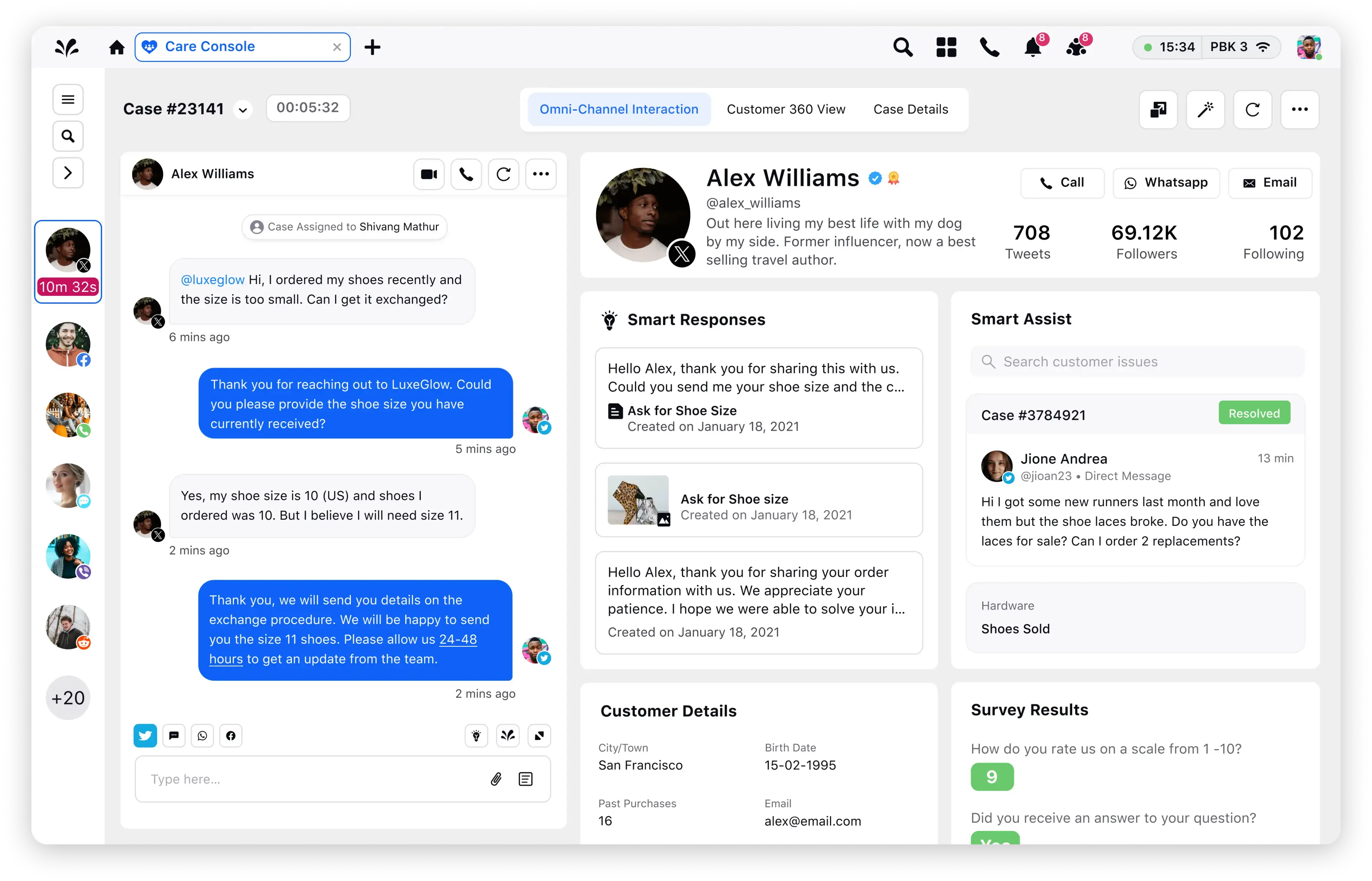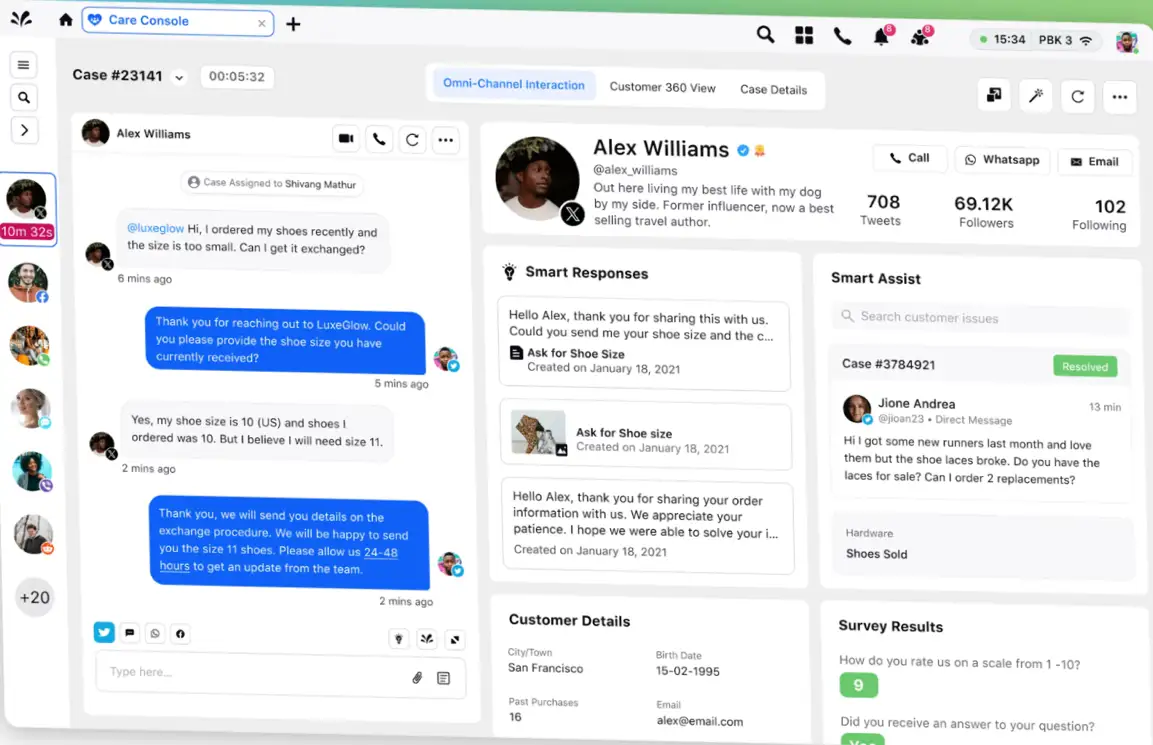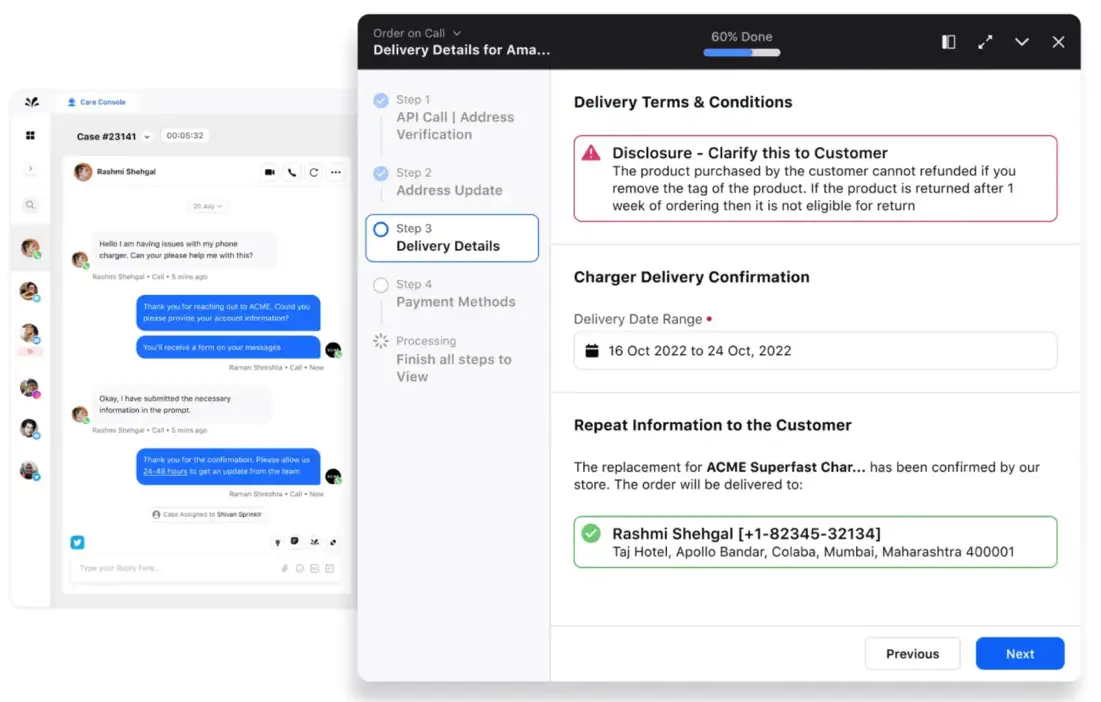The next generation of CCaaS is here
Digital-first customer service, enterprise-scale voice support. Redefine customer service with an AI-powered platform that unifies voice, digital and social channels. Power channel-less interactions and seamless resolution no matter the channel of contact.

12 Key Chat Support Skills for Agents to Excel in 2025
Live chat support bridges a critical gap for both customers and businesses. For customers, it means faster, hassle-free assistance without the frustration of long call queues. It’s an operational game-changer for businesses, enabling agents to manage multiple interactions simultaneously — boosting customer satisfaction while keeping costs under control.
Unsurprisingly, 73% of customers consider live chat the most satisfying way to communicate with a business and 63% are more likely to return to a website that offers it. These stats highlight why enterprises rapidly adopt live chat as a critical part of their customer service strategy.
But here’s the thing — while a robust live chat platform plays an important role, success ultimately depends on the people behind the chat window. Agents need a unique mix of skills to deliver quick, empathetic and precise responses that leave lasting impressions.
In this blog, we’ll uncover the top chat support skills every agent should master — and why you must prioritize these capabilities when building standout support teams. Let’s dive in.
What are chat support skills?
Chat support skills empower contact center agents to effectively assist customers through text-based interactions. These skills ensure that agents can handle inquiries efficiently while maintaining a tone that reflects empathy, professionalism and clarity —all without the benefit of verbal cues.
Why are these skills so crucial? Research reveals that live chat users expect a response within two minutes. This demand for speed highlights the high stakes of chat support, where even a single delayed or poorly crafted response can make or break the customer experience.
Key factors influencing chat support skills include:
Proficiency in AI-driven tools
With AI tools like chatbots now integral to customer service, agents must use these technologies to augment their workflows. Understanding how to collaborate with AI — like seamlessly taking over from chatbots or leveraging predictive insights — ensures faster resolutions and better customer satisfaction.
Balancing automation and human expertise
An automation-focused approach demands agents who can strike the right balance between technology and human intelligence. They must step in where automation falls short, ensuring empathy and personalization are never compromised.
Handling complex inquiries
While AI handles routine queries, agents are increasingly tasked with solving complex issues. This requires advanced problem-solving abilities to tackle situations that automation cannot address, often involving nuanced customer concerns or atypical scenarios.
Mastering multi-system navigation
Agents must navigate multiple platforms — live chat tools, CRMs, knowledge bases and analytics dashboards — without missing a beat. A technically proficient agent can streamline interactions, reducing wait times and customer frustration.
Elevating empathy in a tech-driven world
As automation takes over routine interactions, customers increasingly value the human touch during complex or emotionally charged moments. Even in highly digitized environments, agents must exhibit empathy to create meaningful connections.
🔆 Readers’ Favorite: AI and the human touch: How to fly high in the customer experience sky
Importance of having good chat support skills
Skills for chat support are essential for delivering top-tier customer service, leading to a range of benefits for businesses. Here's a breakdown of the primary advantages with examples.
Improved customer experience
Customer experience is pivotal — 73% of consumers say it drives their purchasing decisions. Skilled chat support agents ensure quick, accurate and personalized responses, creating smooth interactions that make customers feel valued and understood.
Starbucks leverages chat support on social media to engage with customers in real time. Starbucks has significantly improved its digital customer engagement by focusing on timely, friendly responses and fostering strong brand loyalty.
Enhanced customer satisfaction
A skilled agent can identify customer needs, offer tailored solutions and minimize escalations, which translates to greater satisfaction. Customers who experience seamless, low-effort interactions are 94% more likely to repurchase and 88% more likely to spend more.
Bank of America's AI chatbot, Erica, has transformed 24/7 customer support in the banking industry, handling over 1.5 billion interactions. By managing inquiries ranging from account balances to transaction assistance, Erica has reduced wait times and improved satisfaction levels, showcasing the synergy of technology and human expertise.
Increased productivity and efficiency
Skilled chat agents excel at multitasking and problem-solving, allowing them to manage multiple customer interactions without compromising quality. This reduces average handle time (AHT) while increasing the volume of queries resolved.
Amazon's customer service team combines live chat and automation. By training agents to maximize these tools, Amazon achieves faster resolutions and higher productivity, enabling agents to handle more queries per shift. According to McKinsey, such productivity enhancements can lead to 20-30% cost savings.
Must Read: Live Chat Support Explained: 2025 Deployment Guide
12 Chat support skills to excel in 2025
To remain competitive and deliver customer-centric support, you must prioritize cultivating these essential chat support skills.
1. Communication
Effective communication shapes the customer experience and accelerates resolution times.
· Warm openings: Start by greeting the customers as they join the chat, introducing yourself and establishing a friendly, approachable tone. This small gesture fosters trust and reassures customers that they are in capable hands.
· Clarity and simplicity: Use plain, jargon-free language to make the conversation relatable. A simple approach can make the interaction feel human and engaging, even without voice communication.
· Setting expectations: If your agents need to verify information or consult resources, clearly notify the customer with a message like, “Let me check a few details for you. This will take around 2–3 minutes.” Setting expectations avoids leaving customers in the dark and ensures a seamless, frustration-free experience.
2. Empathy
Empathy in chat support is about understanding and validating a customer’s feelings, frustrations and needs. By responding to make them feel heard and valued, agents can transform a transactional interaction into a meaningful connection.
· Timely acknowledgment: Start by recognizing the customer’s concern with a thoughtful apology, such as, “I’m sorry to hear about this.” This simple acknowledgment immediately conveys customer empathy and reassures customers that their issue is taken seriously.
· Transparent communication: Keep customers informed at every step. For example, when verifying details or consulting with a colleague, update them with a message like, “I’m reviewing this for you now. It should only take a couple of minutes.” Transparency builds trust and reduces frustration.
· Personalized responses: Avoid generic, canned replies. Instead, craft thoughtful, solution-oriented responses tailored to the specific situation. This demonstrates a genuine commitment to resolving the issue.
🤝 Empathy in action
Imagine a customer reaches out, frustrated because their online order hasn’t arrived. An empathetic chat agent might respond: “I’m really sorry to hear that your order hasn’t arrived as expected, and I understand how frustrating this can be. Let me check the shipping details right away. This will only take a couple of minutes. In the meantime, can you confirm your order number for me?”
This response acknowledges the customer’s frustration, reassures them of immediate assistance and provides clear next steps — all hallmarks of empathetic service.

3. Multitasking
Today, chat agents are expected to juggle multiple conversations, manage CRM systems and access knowledge bases — all simultaneously. Strong multitasking skills are essential for maintaining accuracy, context and efficiency across interactions. When mastered, multitasking speeds up resolution times and ensures that no customer query goes unanswered, boosting satisfaction and customer loyalty.
Here’s how you can help your agents sharpen their multitasking abilities:
✅ Prioritize high-impact conversations: Train agents to focus on urgent or VIP customer chats first. Timely and thoughtful responses in these interactions can disproportionately impact customer satisfaction.
✅ Master keyboard shortcuts: Encourage agents to use shortcuts for actions like copying, pasting or navigating tools. These small efficiencies compound, especially during high-volume hours.
✅ Utilize automation tools: FAQ chatbots and smart assist can automate repetitive tasks, allowing agents to focus their energy on resolving complex issues.
🔭 Secret Busted
Ever wonder how leading brands manage millions of customer interactions consistently and easily? The secret lies in leveraging modern unified agent consoles.
Instead of switching between 6-7 screens to resolve a single query, agents using unified agent desktops have all relevant customer information, interaction history and support tools accessible on a single interface.
This streamlined workflow reduces AHT by up to 30% and empowers agents to handle concurrent conversations with precision and efficiency

4. Problem solving
These skills enable agents to think critically, make decisions under pressure and guide customers through troubleshooting steps. Such skills are valuable for resolving complex or technical inquiries where quick, logical responses can prevent customer frustration.
Let’s understand this with an example. Imagine a customer-facing connectivity issue with their Wi-Fi-enabled device. An agent equipped with strong problem-solving skills might:
🎯 Ask targeted questions in a conversational manner to confirm details such as the model of the device, error messages and recent changes to the network.
📂 Access the knowledge base for step-by-step troubleshooting guides for the reported issue.
👥 Engage the customer in dialogue, saying:
“It seems the issue might be linked to the network settings. Let’s try resetting the device’s connection. I’ll guide you step-by-step, which should only take a few minutes.”
🪜 Break down the process into smaller actions, such as resetting the router, verifying network credentials and testing the connection.
🔓 From the Vault: How to Empower Your Whole Organization in Problem Solving
5. Adaptability
Adaptable agents can seamlessly handle diverse customer service scenarios, implement new tools or workflows and pivot strategies when unexpected situations arise. This flexibility enhances both efficiency and customer satisfaction by ensuring swift and tailored solutions.
Consider a scenario where you roll out a new AI-powered chatbot to assist with live chat. Adaptable agents would quickly familiarize themselves with the tool, incorporating it into their workflow without compromising the quality of customer interactions. Adopting the change and learning its nuances improves efficiency and enhances the overall customer experience.
6. Time management
Chat support agents often face hundreds of simultaneous requests during peak times —such as holiday sales or service outages. Without effective time management, issues can pile up quickly, leading to longer resolution times, frustrated customers and overwhelmed agents.
Agents with strong time management skills can prioritize tasks effectively, set realistic expectations and stay composed under pressure. By doing so, they can deliver quality support without compromising on speed or accuracy, even when handling multiple queries simultaneously. This balance is crucial to ensuring high customer satisfaction, even in high-stress environments.
💡How Sprinklr helps
As agents engage with customers, Sprinklr AI automatically suggests similar resolved cases, relevant knowledge base articles and guided workflows based on the conversation's context.
By doing so, agents can resolve customer queries 50% faster, as they no longer need to search for information or navigate multiple systems. The AI-driven assistance allows agents to focus more on delivering personalized, high-quality customer service rather than getting bogged down by repetitive tasks or information searches.


7. Product knowledge
A deep understanding of your product enables agents to provide accurate, relevant answers, troubleshoot effectively and recommend solutions or upgrades tailored to each customer’s needs. When agents are well-versed in the product, they can quickly and confidently resolve inquiries, leading to a more positive customer experience and faster resolution times.
8. Technical proficiency
Technical proficiency is a must-have skill for chat support agents. It involves being well-versed in contact center CRM systems, chat platforms, knowledge bases and other tools commonly used in customer service. This proficiency lets agents quickly retrieve customer data, troubleshoot basic technical issues and resolve inquiries with minimal delays, ensuring smoother and faster customer interactions.
To ensure your agents are technically sound, you can implement the following best practices:
✅ Pair new agents with experienced mentors: Create a buddy system where newer agents partner with experienced agents to foster collaborative learning and help them build confidence in using various tools.
✅ Offer a sandbox for experimentation: Encourage agents to explore tools and systems in a safe, risk-free environment. Agents can familiarize themselves with software functionalities and troubleshoot issues by experimenting in a sandbox without the pressure of live interactions.
✅ Conduct hands-on training sessions: Organize practical, hands-on lab sessions where agents can practice navigating through CRM systems and chat platforms. These exercises enable agents to develop their technical proficiency in real-world scenarios, building their confidence and efficiency.
9. Prioritization
Effective prioritization is crucial for managing high chat volumes, especially during peak times. By quickly determining which tasks require immediate attention and which can be deferred, agents can ensure that no chat is left unresolved and that response quality remains high.
To effectively manage task prioritization, here are a few strategies you can implement:
✅ Teach time-management techniques: Introduce prioritization frameworks like the Eisenhower Matrix to help agents categorize chats by urgency and importance. This allows them to focus on high-priority issues first and ensure timely resolutions.
✅ Leverage automation for smart prioritization: Use automation tools to automatically flag chats that need immediate attention or route them to the appropriate agent based on skill or urgency. Learn more about skill-based routing.
✅ Set clear response time targets: Establish response time benchmarks based on the type and complexity of the inquiry. For example, high-priority technical issues should be resolved faster than general inquiries, helping agents manage their time more effectively.
10. Attention to detail
Attention to detail ensures accurate responses, data entry and case resolutions, contributing to a professional and dependable customer experience. Detailed attention helps avoid errors in handling customer information or following steps:
Consider these practical tips to inculcate this quality among your agents.
✅ Pause and review: Encourage agents to take a moment before submitting responses. A brief pause to review can prevent small, unintentional mistakes and help ensure the information provided is correct and precise.
✅ Leverage proofreading tools: Introduce tools that automatically check for grammatical or typographical errors. These tools act as an additional layer of quality control to ensure communication is polished and professional.
✅ Active note-taking: Encourage agents to jot down key details during customer interactions, especially when handling complex issues. This helps agents stay focused and ensures important points are not overlooked during follow-up.
11. Emotional intelligence
Emotional intelligence (EQ) is essential for chat support agents during sensitive customer interactions. EQ empowers agents to recognize, understand and appropriately respond to customer emotions, ensuring that even tricky or frustrating situations are handled with empathy and professionalism. Agents with high emotional intelligence can keep interactions positive and constructive, even when customers are upset.
📌 Pause-breathe-respond technique
Teach agents the importance of pausing and taking a deep breath before responding to an upset or irate customer[SP2] [JS3] . This technique allows agents to regulate their emotions and respond more calmly, avoiding impulsive reactions that could escalate the situation.
Bonus Read: The Role of Emotional Intelligence in Customer Experience
12. Collaboration
Agents who collaborate well can quickly share insights, escalate issues when needed and ensure that customers receive seamless support. Collaboration helps bridge the gap between various teams, ensuring that no problem is left unsolved.
✅ Encourage knowledge sharing: Provide agents with a platform to share insights, solutions and best practices. A centralized knowledge-sharing platform ensures that everyone has access to valuable information, improving the team's support quality.
✅ Leverage open internal chat channels: Enable agents to use internal chat platforms for real-time discussions with peers or other departments. This ensures that agents can quickly address challenges, ask for advice and collaborate on complex issues, which ultimately improves response times and problem resolution
Top resources to learn new skills needed for chat support
To stay ahead in providing exceptional chat support, customer service professionals must constantly develop and refine their skills. Fortunately, various online platforms offer specialized courses, certifications and resources tailored to improving chat support capabilities.
Here are some top resources that can help agents hone the essential skills needed for effective customer service:
LinkedIn Learning
LinkedIn Learning offers a wide range of courses to develop key customer service skills. These courses often include video lessons, quizzes, and real-world examples to reinforce learning and enhance practical application.
Here is a list of popular courses on LinkedIn Learning for chat support.
Coursera
In collaboration with top universities and tech companies, Coursera offers professional certificates and specialized courses in customer service. These courses cover critical areas such as communication, problem-solving, emotional intelligence and effective chat support strategies. Many of Coursera's courses are flexible, allowing you to complete assignments at your own pace, with opportunities for peer feedback.
Recommended courses:
· Introduction to Technical Support by IBM
· Customer Service Fundamentals
Empower skilled chat agents with the right live chat solution
As digital interactions dominate, live chat support has become a critical touchpoint for enterprises seeking to meet these expectations at scale. Yet, with high volumes of inquiries, complex queries and the need for seamless cross-channel interactions, the challenge is clear: how do you empower your agents to deliver exceptional service consistently?
This is where Sprinklr Service steps in as the ultimate partner in transforming your live chat operations.
Sprinklr’s AI-powered live chat support software equips your agents with the tools to navigate high-pressure environments, deliver accurate responses and handle multiple inquiries simultaneously — all from a single unified interface. With enterprise-grade features like:
· AI-powered assistance: Real-time sentiment analysis and dynamic knowledge base extraction accelerate response times and ensure accuracy.
· Seamless authentication: Built-in security features like SSO and OTP validation provide secure, frictionless customer interactions.
· Video commerce: Enhance engagement by directly integrating product search, cart creation and personalized recommendations within the chat.
Sprinklr live chat can also be seamlessly integrated into your websites, mobile applications and in-store kiosks through a lightweight script. Its no-code customization capabilities enable you to align the chat interface with your brand's unique style, ensuring a consistent and engaging customer experience.
Schedule a demo today to discover how Sprinklr can enable you to deliver best-in-class live chat support anytime, anywhere.
Frequently Asked Questions
Chat support teams can achieve this balance by using customizable templates and automation tools, like Sprinklr Service, that allow for quick responses while still incorporating personalized elements based on customer history.
Emotional intelligence enables agents to understand and respond to customer emotions effectively, enhancing satisfaction and loyalty by allowing for empathetic and patient interactions in text-based communications.
AI and machine learning automate routine tasks, requiring agents to develop skills in managing these technologies, interpreting AI suggestions and maintaining a human touch in complex customer interactions
Common challenges include recruiting agents with the right skill mix, maintaining brand voice consistency and addressing the lack of nonverbal cues in text communications.
Latest trends in chat support skills include a focus on hybrid skills, training in AI tools, omnichannel capabilities and gamified learning experiences, all aimed at enhancing adaptability and customer engagement.



